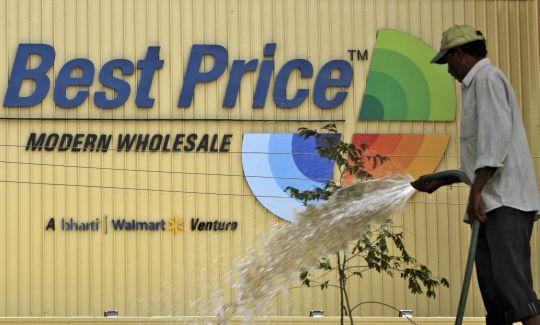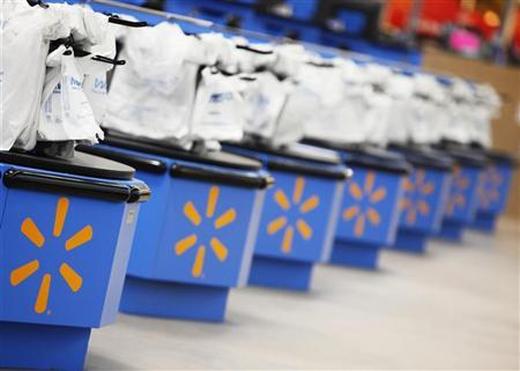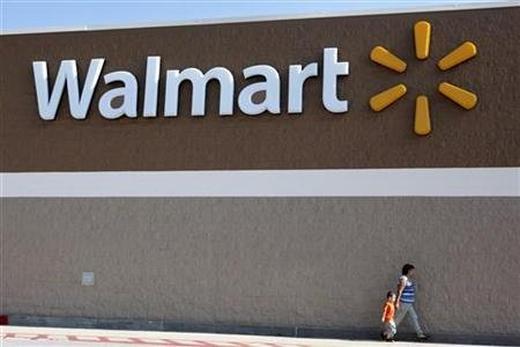Photographs: Reuters Nivedita Mookerji in New Delhi
A series of events have tarnished Walmart's image in the country even before the company has started its retail business. There are charges of corruption, violations of foreign currency norms, and chances of issues with its Indian partner, Bharti. With opposition parties already rallying against FDI in retail, starting its business in the country will not be easy for the retail giant.
Bharti Walmart, the 50:50 'cash-and-carry' venture between Walmart, the world's largest retailer, and Bharti Enterprises, has asked five of its executives not to come to work for some days.
The reason: Experts are probing allegations of corruption in the company. Bharti Walmart has not disclosed what it is, nor has it named the executives who have been suspended.
What is clear is that there has been a violation of the Foreign Corrupt Practices Act (FCPA) of 1977, in the United States, which makes it illegal for American companies to pay bribes anywhere in the world.
While announcing its quarterly results earlier this month, Walmart stated it had extended its internal probe into potential violations of the anti-corruption law to Brazil, China and India.
Walmart claims it has spent more than $35 million on its global FCPA compliance review efforts over the past 18 months and has, in the last six months, embedded professionals from Miami-headquartered law firm Greenburg Traurig in its anti-corruption drive.
"Subject matter experts," the company says, "have provided FCPA training to 328 senior, business unit and store-level associates in India."
There's more. The Enforcement Directorate is investigating Walmart's alleged violation of foreign direct investment regulation under the provisions of the Foreign Exchange Management Act (Fema).
It is alleged that a Mauritius-based subsidiary of Walmart invested Rs 455.8 crore (Rs 4.55 billion) in the retail venture of the Bharti group in 2010, when the sector was closed to foreign investment.
Political opinion is building fast against the government's decision to allow multinationals like Walmart into multi-brand retail, something that is expected to hurt small grocers.
Many states that have non-Congress governments have said they won't let in overseas retailers like Walmart. Grocers, after all, make a large vote bank.
...
Walmart's ride to India gets bumpier
Image: The Wal-Mart logo is pictured on cash registers at a new storePhotographs: John Gress/Reuters
Punjab's deputy chief minister, Sukhbir Singh Badal, had recently told Business Standard that he wouldn't allow foreign retailers in the state, because consumers have already got lower prices from the flourishing cash-and-carry operations of large multinationals like Walmart.
Speculation has also been that all isn't well between the two partners - Bharti and Walmart, and Walmart might select a new partner for its retail foray in the country.
High stakes
The probe has taken the corporate world by surprise. An official of a global retail chain says: "There can be two reasons for the suspension letters. Maybe something has been found in the investigations, or maybe Walmart wants to protect its reputation by acting tough."
Worse, the bribery probe has given ammunition to the opponents of opening up multi-brand retail to foreigners. Critics argue, if Walmart was investigating potential corruption or bribing in the Indian market as part of doing business here, did smaller neighbourhood stores and other Indian retailers with much less muscle power stand a chance?
Praveen Khandelwal, national secretary general of the Confederation of All India Traders, who's led many agitations against opening up multi-brand retail, said at a recent press conference that "the self-admittance of Walmart for paying bribes in India corroborates our stand that, purely to earn profits, the global retailers indulge in malpractices and do not hesitate to even break the law."
Khandelwal even demanded a probe by the Central Vigilance Commission to find out who the beneficiaries of such bribes in India were and what favours Walmart got in return.
Commerce Minister Anand Sharma, when asked about the impact of the Walmart corruption probe on the decision to open up the sector, said a few days ago that the retail policy was now cast in stone. "I don't see any situation where investors' confidence would be dampened."
Retail guru Arvind Singhal, founder and chairman of Technopak Advisors, has a different take on the issue. Leaving aside the rhetoric against the possible corruption being probed, Singhal points out that one has to procure over 50 licences before starting and, therefore, bribery is a fact of life in this country to get things moving. He adds in plain terms, "Every business pays bribes."
...
Walmart's ride to India gets bumpier
Photographs: Reuters
The FCPA violation is a serious matter. Walmart got a taste of it late last year over a case in Mexico. An investigation carried out by The New York Times alleged there was a $24-million scheme to pay off Mexican city governments in return for permission to open supermarkets in the country.
The report had said Walmart's top officials had not taken note of the Mexican bribes when informed about it in 2005 (Mexico is among the other difficult places to do business, in terms of the number of licences required).
Under the FCPA, Walmart, as an American company, must keep the Department of Justice informed of any violation. But in the case of Mexico, Walmart allegedly gave out the information many years later when it learnt of the investigation by The New York Times Obviously, Walmart doesn't want another embarrassment.
Caution ahead
The current investigation could, therefore, slow it down in India. Sources in the company admit that there's a definite delay in the rollout plans of Walmart in terms of multi-brand retail. Also, the cash-and-carry or wholesale business might face slowdown, following the corruption investigation.
Just after the Cabinet had cleared 51 per cent foreign investment in multi-brand retail in September, Walmart India President Raj Jain had said of the company's prospects in the country: "It's a marathon."
At that point, he was only thinking of the policy hurdles and perhaps bureaucratic red tape. The allegation related to bribery, that might have helped the company side-step such red tape, had not surfaced then.
On partnership, which is more of an internal matter, Walmart's Jain in an interview to Business Standard, almost two months ago, had said the American chain would like to explore a tie-up with Bharti, as it was its natural partner in India, flowing from the cash-and-carry connection of the past five years.
But, he had added an open-ended, "let's see". He had said: "it all boils down to policy clarity in terms of what kind of partners and partnerships we need."
Equity stakes of the partners could be an issue. While Bharti might like to go for a 50:50 partnership, like in cash-and-carry, Walmart might want the maximum it can get, or 51 per cent.
Jain had told Business Standard in the earlier interview that Walmart would like to go for whatever was allowed. "We are legally permitted to have 51 per cent in the venture," Jain had said.
...
Walmart's ride to India gets bumpier
Photographs: Reuters
As for the immediate impact of the bribery probe on Walmart's India business, both Walmart and Bharti have maintained that there is no change in plan as far as their proposed joint venture for multi-brand retail is concerned. But, there has been much talk of the two being stuck at the negotiating table.
The corruption probe and the suspension of executives have played spoilsport, sources say. Replying to queries on whether other partnership options could be considered, Bharti Walmart says: "Our partnership with the Bharti group is a natural progression for front-end retailing. Currently, we are in discussions with them and will inform you as and when we reach an understanding on the business model." A Bharti spokesperson says: "We remain fully committed to our partnership with Walmart."
In case Walmart and Bharti do form a partnership, what will be their brand? Bharti already runs over 200 stores called 'Easyday', across the country.
The brand, experts say, could be an issue but not a roadblock. Bharti might want to retain the Easyday name, while Walmart might like something of its own in the name tag. But, Walmart is known for its flexibility on names, with 62 brands across the world.
"Walmart is not in the habit of insisting on its brand name," Rajan Mittal, vice-chairman and managing director of Bharti Enterprises, had said in a recent interview. In the UK, Walmart stores are called 'Asda', in Mexico 'Walmex', and 'Seiyu' in Japan.
Then there are other issues Walmart needs to sort out. Opposition parties have argued that Walmart and the likes may fill their shelves with Chinese products. Who said the road ahead would be easy?






article